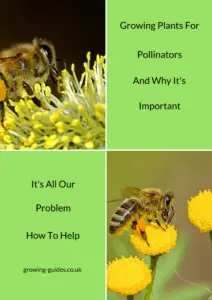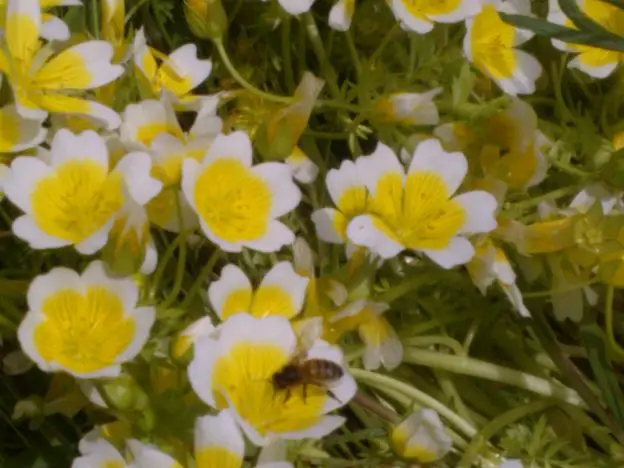In this post, I explore the reasons for growing plants for pollinators and why it’s important for your garden or vegetable plot. It is also important for the conservation of wildlife. There are reports that bees are on the decline worldwide, so any help we as growers can offer must be a good thing.
Growing Plants For Pollinators And Why It’s Important
According to the Bumble bee conservation trust, two species of bumble bee have become extinct in the UK since the start of the twentieth century. With another two species of bee in danger of imminent extinction. Theories as to the reasons behind the decline of bee populations vary but let’s have a look at some.
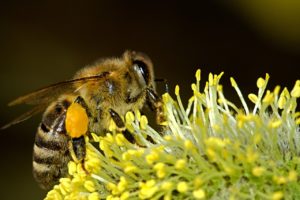
Reasons For The Decline Of The Bee Population
Bumblebees are mainly under threat because of changes to the countryside in the UK. Changes in agricultural techniques have meant that there are far fewer wildflowers in the landscape than there used to be, meaning that many of our bumblebee species are struggling to survive.
The Bumble bee conservation trust
Population levels of more than 700 North American bee species are declining as habitat loss and pesticide use continue at a breakneck pace, according to a new report.
The destruction of natural habitat, and the increased use of pesticides has led to a global decline in bee populations. We can all blame the farming industry but playing the blame game is not going to help the bees. We all need to be proactive if we want to help to reverse this decline.
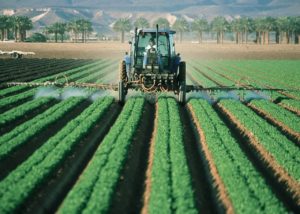
What Can We Do
As responsible, organic gardeners, we should shy away from using chemical pesticides and herbicides as a matter of course. We should also be growing bee friendly plants throughout the season. Paying particular attention to early and late flowering plants.
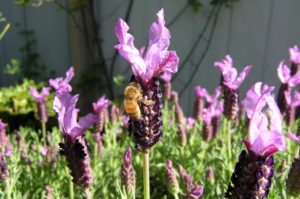
Which Plants For Pollinators?
If possible leave an area however small for wildflowers, it doesn’t have to be anything specially bought, Dandelions are a good source of nectar for early and late bees and they grow pretty much anywhere. If however you wish to take it further, below is a list compiled by the Telegraph, containing not only what to grow but also when they are in flower. (Their highlights).
November-February March April May Chaenomeles Crocus Aubrieta Aquilegia Clematis cirrhosa Erica carnea Doronicum Borage Eranthis – winter aconites Primroses and polyanthus Grape hyacinth Cowslips Mahonia, winter flowering Pulmonaria Fruit blossom – pear, cherry, plum Fruit blossom – apple and crab apple Lonicera x purpusii Single snowdrops Primroses, polyanthus, cowslips Hardy geraniums Viburnum tinus Violets Violets Ribes sanguineum Early crocus, eg C. tommasinianus Willows Wallflowers Strawberry June July Angelica Thyme Angelica Greater knapweed Borage Viper’s bugloss Borage Marigolds Catmint (Nepeta) Buddleias Raspberry, blackberry Honeysuckle Dahlias – single and semi-double varieties, such as ‘Bishop of Llandaff’ and ‘Classic Rosamunda’ Sages / salvias Lupins Globe thistles / echinops Scabious Marigolds – open centred forms better than multi-petalled Eryngiums or sea hollies, such as Eryngium planum, E. x tripartitum Viper’s bugloss Sages/salvias Lavender Scabious Lupin August September October Borage Sedum spectabile Aster amellus Aconitum carmichaelii Buddleia Scabious Aster novae-angliae Aster lateriflorus Caryopteris Sunflowers Colchicum Salvia leucanthina Dahlias – as above Viper’s bugloss Clematis heracleifolia Echinacea Eupatorium Echinacea Ivy flowers Helenium Ivy flowers Rudbeckia Lavender Rudbeckia Dahlias – as above Greater knapweed Scabiosa atropurpurea varieties Sages/salvias
Why We Need Pollinators
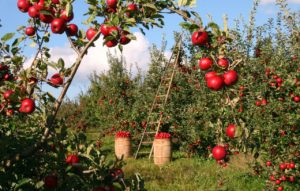
Most people will be aware of the reasons for conserving pollinators, but just in case there is any doubt, here are a few plants that rely on pollinators to produce fruit/ vegetables.
- Apples
- Pears
- Apricots
- Peaches
- Nectarines
- Plums
- Courgettes
- All Squashes
- Runner Beans
- Broad Beans
As you can see without pollinators other ways to pollinate would have to be found, these would prove to be expensive and not as efficient.
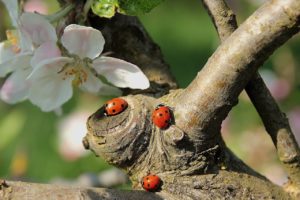
Not Just Pollinators
There are many other insects that do not rely on nectar but do other jobs in the garden. These include Hoverflies, Lacewings and Ladybirds. All of these are being killed by pesticides.
What Else Can We Do?
As consumers we can buy only organic produce from certified organic growers. By voting with our pocket, producers will eventually have to become more ecologically savvy. Well, I can dream.
Growing Plants For Pollinators Conclusion
It is vitally important for the survival of life on this planet that we take some responsibility for the future of our wildlife. This is not someone else’s problem, this affects us all.
Related Posts
